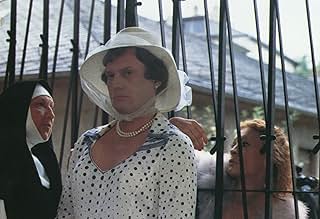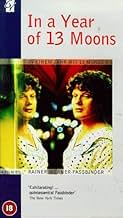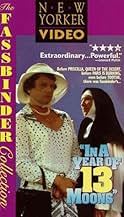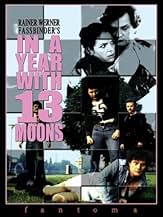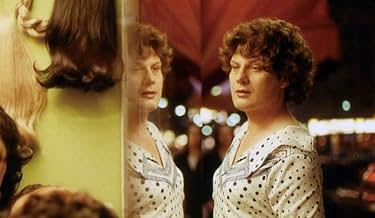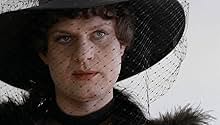IMDb RATING
7.3/10
5K
YOUR RATING
A transgender woman tries to salvage something from the wreckage love has made of her life by confronting her anguished past, hoping to find ultimate acceptance among former acquaintances an... Read allA transgender woman tries to salvage something from the wreckage love has made of her life by confronting her anguished past, hoping to find ultimate acceptance among former acquaintances and herself.A transgender woman tries to salvage something from the wreckage love has made of her life by confronting her anguished past, hoping to find ultimate acceptance among former acquaintances and herself.
- Director
- Writer
- Stars
- Awards
- 1 win total
Lilo Pempeit
- Schwester Gudrun
- (as Lieselotte Pempeit)
Janez Bermez
- Oskar Pleitgen
- (uncredited)
Rainer Werner Fassbinder
- Self
- (archive footage)
- (uncredited)
Günther Holzapfel
- Angestellter H. H. Brei
- (uncredited)
Ursula Lillig
- Putzfrau
- (uncredited)
Augusto Pinochet
- Self
- (archive footage)
- (uncredited)
- Director
- Writer
- All cast & crew
- Production, box office & more at IMDbPro
Featured reviews
In A Year With 13 Moons was directed rather late in director Werner Rainer Fassbinder's career, and in this film you almost get a whiff of life imitating art as you feel like you're watching the last days of Fassbinder as a director. In this film you can see the influence of films that Fassbinder admired, for example, Le Diable probablement, but In A Year With 13 Moons is bleak and impersonal in a way that the aforementioned film is not. It lacks the aesthetic obsession that French films often have and instead there is an emphasis on showing people and places as they truly are.
There are scenes that take place in darkened rooms where you almost get a contrived, science-fiction feel, and you're reminded that in all fiction the process of "world-building" occurs, but it's less obvious in contemporary drama because the viewer/reader is able to associate the names of places and people in the drama with real places and people, so the contrived nature and world-building are neatly tucked under the rug for no one to see. The film is remarkable in its tale of Elvira/Erwin who breaks up with her lover and then has to meet up with an old acquaintance after a misunderstanding. The actors totally inhabit their roles as they generally do in Fassbinder's films and this certainly is a testament to Fassbinder's brilliance as a director.
The primary weakness of this film is that it lacks naturalness and feels just a little too false, in contrast to, for example, Fassbinder's Fox and His Friends, which feels very natural. In A Year With 13 Moons is artsier, somewhat commedia-dell'arte-esque with its stereotypical characters, but after watching so many bad films recently this particular film felt like a breath of fresh air. A notable scene occurs at a butcher site or mechanical abattoir where cattle are being bled and slaughtered, which again was a little reminiscent of the scenes of environmental degradation in Le Diable probablement. In A Year With 13 Moons is a must-see. 8 out of 10.
There are scenes that take place in darkened rooms where you almost get a contrived, science-fiction feel, and you're reminded that in all fiction the process of "world-building" occurs, but it's less obvious in contemporary drama because the viewer/reader is able to associate the names of places and people in the drama with real places and people, so the contrived nature and world-building are neatly tucked under the rug for no one to see. The film is remarkable in its tale of Elvira/Erwin who breaks up with her lover and then has to meet up with an old acquaintance after a misunderstanding. The actors totally inhabit their roles as they generally do in Fassbinder's films and this certainly is a testament to Fassbinder's brilliance as a director.
The primary weakness of this film is that it lacks naturalness and feels just a little too false, in contrast to, for example, Fassbinder's Fox and His Friends, which feels very natural. In A Year With 13 Moons is artsier, somewhat commedia-dell'arte-esque with its stereotypical characters, but after watching so many bad films recently this particular film felt like a breath of fresh air. A notable scene occurs at a butcher site or mechanical abattoir where cattle are being bled and slaughtered, which again was a little reminiscent of the scenes of environmental degradation in Le Diable probablement. In A Year With 13 Moons is a must-see. 8 out of 10.
Fassbinder's genius is making you feel as trapped and desperate as Elvira, you really feel empathy for the character. Only the visit with her family is there a brief respite from her pain. Kudos for Fassbinder for his good taste in using Suicide's "Frankie Teardrop" on the soundtrack--a song about a man who feels trapped, but directs his anger outward, rather than inward, like Elvira.
The story the idea of this movie, is amazing. It really does showcases how somebody that went through extreme child trauma being isolated, lonely, sad, wanted love from a male figure, and that was not possible from the one he-she wanted. It really is a fascinating story.
However, i have a huge problem with this movie and that's the pacing. I can assure you that 40 minutes or so could of been removed from this movie, and we'd have a better paced movie.
Minus the pacing, everything here works. The acting is alright, the camera work is okay, the story is alright. Everything here works. Minus the pacing.
The cow slaughtering scene was completely out of left field. Yes yes, our main character our star, worked as a butcher. But the problem with that is, this whole movie is a tragic, depressing drama. And out of no where, we just get cow murder exploitation? Why??? It really did not have to be in this movie at all! We had a tragic drama, and we added cow murder for no reason! It's so out of field, it pulls you out of the story completely, and it felt like i was watching FACES of DEATH again. Ludacris.
Another problem i got is, the suicide scene of that man. It has nothing to do with the story it's just added there so the movie gets longer and padded. This entire movie could of been better if stuff that have nothing to do with the movie aren't here. Also the prologned television scene, it took them ages for that to finish.
Ultimately yes i enjoyed this movie, but at the same time it is a chore to get through it really is. Also i think i have to rewatch this probably 2 - 3 time to actually get all the details. There's many details in this that are really hard to follow.
I mean if you are into drama misery films like JACOB's LADDER, you'll probably enjoy this.
However, i have a huge problem with this movie and that's the pacing. I can assure you that 40 minutes or so could of been removed from this movie, and we'd have a better paced movie.
Minus the pacing, everything here works. The acting is alright, the camera work is okay, the story is alright. Everything here works. Minus the pacing.
The cow slaughtering scene was completely out of left field. Yes yes, our main character our star, worked as a butcher. But the problem with that is, this whole movie is a tragic, depressing drama. And out of no where, we just get cow murder exploitation? Why??? It really did not have to be in this movie at all! We had a tragic drama, and we added cow murder for no reason! It's so out of field, it pulls you out of the story completely, and it felt like i was watching FACES of DEATH again. Ludacris.
Another problem i got is, the suicide scene of that man. It has nothing to do with the story it's just added there so the movie gets longer and padded. This entire movie could of been better if stuff that have nothing to do with the movie aren't here. Also the prologned television scene, it took them ages for that to finish.
Ultimately yes i enjoyed this movie, but at the same time it is a chore to get through it really is. Also i think i have to rewatch this probably 2 - 3 time to actually get all the details. There's many details in this that are really hard to follow.
I mean if you are into drama misery films like JACOB's LADDER, you'll probably enjoy this.
Many, if not all of Fassbinder's films focus on weighty, emotional issues and characters plunged into personal despair, but none more so than the torturous and overpowering melodrama of In a Year of 13 Moons (1978). Here, Fassbinder created a film that is completely miserable in both tone and content from the first frame until the last; with the director taking the personal loss over the suicide of his lover Armin Meier and turning it into a suffocating chamber piece of pain and humiliation. Like his earlier masterpiece, Fox and his Friends (1975), the film focuses on the personal exploitation and persecution of a sensitive character at the hands of the people that he loves, as he finds himself cast against a cruel backdrop of the grimy and oppressive homosexual sub-culture of 1970's Frankfurt. However, unlike Fox and his Friends, the spirit of Meier's death and the guilt that we assume Fassbinder was suffering from at the time of the film's conception have here removed any prevailing notion of hope or the promise of escape that hung-over the character of Franz - the lottery winning carnival worker from the aforementioned "Fox", as he sought an end to his cruel suffering - and replaced it with a continually degrading emphasis on shame and deprivation.
Fassbinder establishes the pitiless tone of the film right from the start, with an opening vignette showing our central character, dowdy transsexual Elvira Weishaupt, dressed as a man and wandering through a park in the early hours of the morning looking for trade. After successfully managing to hook-up with a suitably butch male-prostitute, her secret is soon discovered and the 'john', alongside a couple of similarly macho friends, beat and mock Elvira, leaving her as a shivering, crying wreck, half-naked on an disused train-track. From here, Elvira limps home to her cramped apartment only to be plunged into a torturous, violent argument with her ex-boyfriend, which again, leaves her used and humiliated. The film continues in this episodic approach as we follow Elvira over the course of a few days and eventually find out more about her true character and personality and the events in her life that led to the eventual creation of the person that she is when we first discover her. These events are no less cruel and humiliating to the character of Elvira - who has clearly made a number of mistakes, either as a result of naiveté, arrogance or blind stupidity - as we discover the process that turned a handsome young man with a wife and infant daughter into an overweight, alcoholic wreck, abused and betrayed by the various men in her life, and the social pariahs that hang on the periphery.
As ever with Fassbinder, the presentation of the film underpins the feelings of the character and the world that she inhabits perfectly; with the cramped spaces of her apartment made even more prison-like and oppressive by the director's claustrophobic use of staging, design and composition. Fassbinder undertook the role of cinematographer himself here and shot the film on grainy 16mm, which again, adds to the stark and colourless feeling that the film conveys. The ugliness of the cinematography, with its dimly lit rooms, fragment composition and awkward camera movements could be seen as either amateurish on the part of the filmmaker, or as a deliberate attempt to distance the viewer from the characters and the emotional subtext in a manner that is reminiscent of Brecht; or, more appropriately, Godard's cinematic appropriation of Brecht and his theatre of alienation. As with the subsequent political satire, The Third Generation (1979) - once again, shot by Fassbinder himself - the unconventional approach to cinematography is combined with further elements that attempt to similarly disarm us and make the process of viewing the film as difficult as possible. The opening scene itself is emblematic of this approach, with Fassbinder obscuring the frame with large titles and an opening text that scrolls slowly over the entire frame before continuing with his use of obscured images and fragmented mise-en-scene.
Fassbinder also uses jarring cuts, with scenes seemingly beginning during the middle of a conversation or after the context of the scene has already been established, whilst sound and the disorientating way in which the director has characters talking over one another while music plays disconcertingly in the background all continue this idea of deconstruction and emotional distraction. The ugliness of the film fits perfectly with its tone; with the legendary scene in which Elvira and her friend wander ghost-like through an actual slaughterhouse, where cows are dispatched in graphic detail, whilst a monologue is recited to give us the entire back-story of this truly tragic figure. Whether or not Elvira is an extension of Fassbinder or the personification of Armin Meier is unknown, though there is certainly that element to the interpretation. I'd imagine that there is also some of the director in the portrayal of manipulative antagonist Anton Saitz, who recalls the depiction of Fassbinder in the director's own segment of Germany in Autumn (1978). Regardless, In a Year of 13 Moons is a fascinating if entirely difficult work from Fassbinder; one that brims with an uncomfortable feeling of personal confession and searing self examination that is grotesque, repellent and utterly draining, whilst also standing as a powerful and passionately realised piece of work that is both remarkable and affecting.
Fassbinder establishes the pitiless tone of the film right from the start, with an opening vignette showing our central character, dowdy transsexual Elvira Weishaupt, dressed as a man and wandering through a park in the early hours of the morning looking for trade. After successfully managing to hook-up with a suitably butch male-prostitute, her secret is soon discovered and the 'john', alongside a couple of similarly macho friends, beat and mock Elvira, leaving her as a shivering, crying wreck, half-naked on an disused train-track. From here, Elvira limps home to her cramped apartment only to be plunged into a torturous, violent argument with her ex-boyfriend, which again, leaves her used and humiliated. The film continues in this episodic approach as we follow Elvira over the course of a few days and eventually find out more about her true character and personality and the events in her life that led to the eventual creation of the person that she is when we first discover her. These events are no less cruel and humiliating to the character of Elvira - who has clearly made a number of mistakes, either as a result of naiveté, arrogance or blind stupidity - as we discover the process that turned a handsome young man with a wife and infant daughter into an overweight, alcoholic wreck, abused and betrayed by the various men in her life, and the social pariahs that hang on the periphery.
As ever with Fassbinder, the presentation of the film underpins the feelings of the character and the world that she inhabits perfectly; with the cramped spaces of her apartment made even more prison-like and oppressive by the director's claustrophobic use of staging, design and composition. Fassbinder undertook the role of cinematographer himself here and shot the film on grainy 16mm, which again, adds to the stark and colourless feeling that the film conveys. The ugliness of the cinematography, with its dimly lit rooms, fragment composition and awkward camera movements could be seen as either amateurish on the part of the filmmaker, or as a deliberate attempt to distance the viewer from the characters and the emotional subtext in a manner that is reminiscent of Brecht; or, more appropriately, Godard's cinematic appropriation of Brecht and his theatre of alienation. As with the subsequent political satire, The Third Generation (1979) - once again, shot by Fassbinder himself - the unconventional approach to cinematography is combined with further elements that attempt to similarly disarm us and make the process of viewing the film as difficult as possible. The opening scene itself is emblematic of this approach, with Fassbinder obscuring the frame with large titles and an opening text that scrolls slowly over the entire frame before continuing with his use of obscured images and fragmented mise-en-scene.
Fassbinder also uses jarring cuts, with scenes seemingly beginning during the middle of a conversation or after the context of the scene has already been established, whilst sound and the disorientating way in which the director has characters talking over one another while music plays disconcertingly in the background all continue this idea of deconstruction and emotional distraction. The ugliness of the film fits perfectly with its tone; with the legendary scene in which Elvira and her friend wander ghost-like through an actual slaughterhouse, where cows are dispatched in graphic detail, whilst a monologue is recited to give us the entire back-story of this truly tragic figure. Whether or not Elvira is an extension of Fassbinder or the personification of Armin Meier is unknown, though there is certainly that element to the interpretation. I'd imagine that there is also some of the director in the portrayal of manipulative antagonist Anton Saitz, who recalls the depiction of Fassbinder in the director's own segment of Germany in Autumn (1978). Regardless, In a Year of 13 Moons is a fascinating if entirely difficult work from Fassbinder; one that brims with an uncomfortable feeling of personal confession and searing self examination that is grotesque, repellent and utterly draining, whilst also standing as a powerful and passionately realised piece of work that is both remarkable and affecting.
"In a Year of 13 Moons" is a harrowing and brutal film that explores the themes of identity, human suffering and despair. Fassbinder's films, for the most part, are penetrating glimpses into the human condition at its most vulnerable. I really adore Ingmar Bergman's films, but they are considered "too pessimistic or depressing" for some, but my goodness, Rainer Werner Fassbinder's are bleak as night, often set in an unforgiving, cold and unreceptive world.
The film follows Elvira Weishaupt (Volker Spengler), a troubled and struggling transgender woman, who is wrestling with her identity. Fassbinder would construct the film through a non-linear narrative, that intertwines her many painful memories, her personal encounters, and the many philosophical thoughts and reflections on her life. Considered by many to be one of Fassbinder's most challenging and deeply personal films, and for good reason too. Fassbinder would make "In a Year of 13 Moons" in response to the suicide of his close lover, and this grief added to the intense and turbulent atmosphere that the film carries. The themes of rejection and despair are strong themes that drive the film, along with the search for love, and the pain and devastation of its absence. One of my favorite directors, Richard Linklater, would regard it as his favorite Fassbinder film. It is claustrophobic and very depressing, but for people who enjoy character driven dramas, then you may appreciate it.
The film follows Elvira Weishaupt (Volker Spengler), a troubled and struggling transgender woman, who is wrestling with her identity. Fassbinder would construct the film through a non-linear narrative, that intertwines her many painful memories, her personal encounters, and the many philosophical thoughts and reflections on her life. Considered by many to be one of Fassbinder's most challenging and deeply personal films, and for good reason too. Fassbinder would make "In a Year of 13 Moons" in response to the suicide of his close lover, and this grief added to the intense and turbulent atmosphere that the film carries. The themes of rejection and despair are strong themes that drive the film, along with the search for love, and the pain and devastation of its absence. One of my favorite directors, Richard Linklater, would regard it as his favorite Fassbinder film. It is claustrophobic and very depressing, but for people who enjoy character driven dramas, then you may appreciate it.
Did you know
- TriviaThe tape-recorded narration heard throughout the film (particularly during the final scene) was not scripted. Volker Spengler (playing Elvira Weishaupt) and Rainer Werner Fassbinder recorded the narration together, with Fassbinder asking questions and Spengler responding in character. In the final cut of the film, Fassbinder's voice is edited out.
- SoundtracksSchöner fremder Mann
Music and Words by Athena Hosey and Hal Gordon and German lyrics by Camillo Felgen
Performed by Connie Francis
- How long is In a Year with 13 Moons?Powered by Alexa
Details
- Release date
- Country of origin
- Language
- Also known as
- In a Year with 13 Moons
- Filming locations
- Production companies
- See more company credits at IMDbPro
Box office
- Budget
- DEM 700,000 (estimated)
- Runtime2 hours 4 minutes
- Sound mix
- Aspect ratio
- 1.66 : 1
Contribute to this page
Suggest an edit or add missing content

Top Gap
By what name was L'année des treize lunes (1978) officially released in India in English?
Answer
